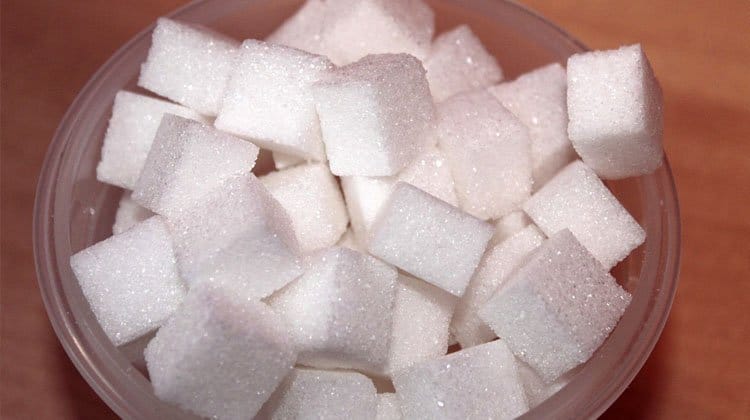Joint pain interferes with normal movement by causing inflammation, discomfort, and soreness in any of the joints in your body. It’s a very common problem and can occur irrespective of age and gender. The pain can be acute or chronic and can range from mild or severe, making normal use of your joints unbearable.
Arthritis and gout are the two main causes of joint pain. It can also result from muscle strains, broken or dislocated bones, bursitis, fibromyalgia, leukemia, and lupus.
However, joint pain can be improved by proper medication, diet, alternative medicine, and exercise. While there are many anti-inflammatory foods like ginger, turmeric, and garlic that can help fight pain, there are also certain foods that trigger pain.
1. Refined and Artificial Sugars

High amounts of sugar increase the level of toxins called advanced glycation end products (AGEs) that can cause inflammation. Furthermore, the American Journal of Clinical Nutrition warns that processed sugars trigger the release of inflammatory messengers called cytokines.
The problem with sugar is that it is highly integrated into all processed foods and it goes by many names. In fact, in a previous article, we showed 56 tricky names that hide sugar. Generally, look out for any word ending in “ose,” e.g. fructose or sucrose on ingredient labels.
Being high in calories, and excess sugar intake also leads to weight gain, which puts more pressure on your joints and increases pain. Avoid sugar-sweetened beverages like soft drinks, pre-sweetened cereals, fruit drinks, and punches as well as sugar-loaded foods like pastries, candy, and snacks.
If sweeteners are absolutely necessary, instead of refined sugar and artificial sweeteners, opt for natural ones like stevia, honey, or blackstrap molasses.
2. Dairy Products

Dairy products can intensify joint pain because of high levels of protein casein that triggers pain and inflammation. According to a report by the Physicians Committee for Responsible Medicine, this type of protein may even irritate the tissue around the joints.
Even the saturated fats in full-fat dairy products like milk, butter, and cheese can trigger inflammation, which will increase pain. If you suffer from joint pain or any other chronic pain avoid consuming pasteurized milk and replace it with almond or soy milk, margarine, tofu, or other products.
3. Omega 6 Fatty Acids

Excess consumption of omega-6s can trigger the body to produce pro-inflammatory chemicals, and the American diet tends to be very high in omega-6s. They shouldn’t be avoided, but you don’t want them to dominate your meals. You simply need to consume them in moderation. Meanwhile, increase your intake of omega-3 fatty acids found in foods like olive oil, nuts, flaxseeds, and pumpkin seeds.
A 2012 study published in the Journal of Nutrition and Metabolism notes that an increase in omega-6 fatty acid intake could potentiate inflammatory processes and exacerbate many inflammatory diseases. Safflower, sunflower, grapeseed, soy, and peanut oils as well as mayonnaise and many salad dressings are also rich in omega-6 fatty acids.
4. Refined Grains and Flour

Refined grains and flour are also pro-inflammatory agents and can increase your joint pain. White flour products (bread, rolls, crackers) white rice, white potatoes (instant mashed potatoes, or french fries), and many cereals are refined carbohydrates. According to Scientific American, processed carbohydrates may trump fats as the main driver of escalating rates of obesity and other chronic conditions. These high-glycemic index foods fuel the production of advanced glycation end (AGE) products that stimulate inflammation.
5. Processed and Red Meats

Processed meat and red meat are not only loaded with AGEs but also contain chemicals like nitrites and purines that can increase inflammation and pain in the body.
According to a study from 2014, published in the Proceedings of the National Academy of Sciences, red-meat glycan aids inflammation and progression of cancer. Another study published in the American Journal of Clinical Nutrition in the same year has found a connection between red meat consumption and biomarkers of inflammation.
Go for fresh vegetables and fruits instead of processed meats, whenever possible.
6. Eggs

Regular intake of eggs can lead to increased swelling and joint pain. The yolks are rich in arachidonic acid which leads to the production of prostaglandins, which trigger inflammation in the body.
Moreover, eggs contain saturated fat, which also contributes to inflammation and pain. If you like to eat eggs for breakfast, skip the yolks and use just egg whites to make your omelet.
7. Whey Protein

Whey protein products have also been found to promote inflammation and joint pain due to the gluten and casein found in them.
Casein leads to the production of uric acid in the body, which can lead to pain and inflammation. Joint pain due to uric acid, known as gout, can be severe and can do lasting damage to the joints.
People sensitive to gluten can suffer from chronic inflammation with widespread pain. According to a study published in the Journal of Nutritional Biochemistry in 2013, gluten-free food can reduce inflammation, insulin resistance, and adiposity.
Always choose healthy sources of lean protein such as seeds, beans, and nuts rather than whey protein supplements.
8. Refined Salt
Table salt is not good for your joint pain. Refined salt contains additives and chemicals (ferrocyanide and aluminosilicate) to make it free-flowing, but they can unsettle your body’s fluid balance.
Besides, refined salt does not contain naturally occurring minerals, such as silicon, and phosphorous that your body needs to function properly. Limiting your refined salt intake may also reduce calcium loss from your bones, thus reducing the risk of osteoporosis and fractures.
If possible, switching to sea salt or pink Himalayan salt would be advisable.
9. Foods containing Monosodium Glutamate

Monosodium glutamate (MSG) is a flavor-enhancing food additive most commonly found in prepared Asian food and soy sauce, but it can also be added to fast foods, prepared soups and soup mixes, salad dressings, and deli meats. This chemical can trigger two important pathways of chronic inflammation, and affect liver health.
As most packaged and frozen foods contain artificial additives like MSG, strive to eat fresh foods prepared at home. Along with MSG, avoid foods containing aspartame, a non-nutritive, artificial sweetener that also triggers an inflammatory response.
10. Alcohol

Alcohol is a burden to the liver. Excessive use weakens liver function and disrupts other multi-organ interactions and can cause inflammation. It is best eliminated or used in moderation.
Beer, for example, is high in purine that the body converts to uric acid, which can cause inflammation. Also, beer is made with gluten, so it is best to avoid it when suffering from joint pain.
Resources:
http://www.pnas.org/content/112/2/542.short
http://www.hindawi.com/journals/jnme/2012/539426/
http://www.ncbi.nlm.nih.gov/pmc/articles/PMC3705319/
http://www.jnutbio.com/article/S0955-2863%2812%2900226-4/abstract

